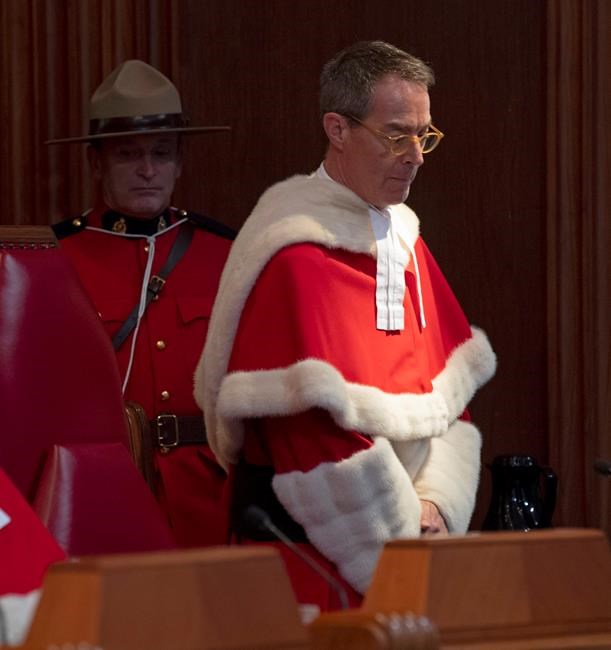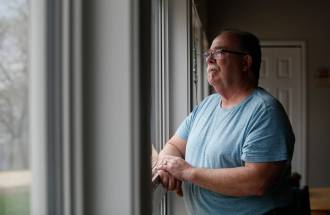Man who beat victim to death with bat given chance to change plea after Supreme Court ruling
Read this article for free:
or
Already have an account? Log in here »
To continue reading, please subscribe:
Monthly Digital Subscription
$0 for the first 4 weeks*
- Enjoy unlimited reading on winnipegfreepress.com
- Read the E-Edition, our digital replica newspaper
- Access News Break, our award-winning app
- Play interactive puzzles
*No charge for 4 weeks then price increases to the regular rate of $19.00 plus GST every four weeks. Offer available to new and qualified returning subscribers only. Cancel any time.
Monthly Digital Subscription
$4.75/week*
- Enjoy unlimited reading on winnipegfreepress.com
- Read the E-Edition, our digital replica newspaper
- Access News Break, our award-winning app
- Play interactive puzzles
*Billed as $19 plus GST every four weeks. Cancel any time.
To continue reading, please subscribe:
Add Free Press access to your Brandon Sun subscription for only an additional
$1 for the first 4 weeks*
*Your next subscription payment will increase by $1.00 and you will be charged $16.99 plus GST for four weeks. After four weeks, your payment will increase to $23.99 plus GST every four weeks.
Read unlimited articles for free today:
or
Already have an account? Log in here »
Hey there, time traveller!
This article was published 18/05/2022 (1300 days ago), so information in it may no longer be current.
The impact of a Supreme Court of Canada ruling — that the law barring the defence of extreme intoxication for some violent crimes is unconstitutional — is already being felt in Winnipeg courtrooms.
Extreme-intoxication law unconstitutional: SCOC

Posted:
OTTAWA - Canada's highest court has ruled that the law barring the use of automatism, or a state of extreme intoxication, as a defence for some crimes is unconstitutional and called on Parliament to consider new legislation.
A scheduled manslaughter sentencing for Lucas Duck was adjourned on Monday after Queen’s Bench Justice Shawn Greenberg asked his lawyers if they wanted to reconsider his guilty plea in light of the Supreme Court’s ruling.
“I have reasons for the decision on sentencing I was prepared to deliver this morning, but I have to raise an issue I feel compelled to raise as a result of the trilogy of cases that came out in the Supreme Court in which the fact situations are similar to this case,” Greenberg said.
“Because of that, I have to ask whether that has any impact on the plea and whether the defence wants to consider whether they should be withdrawing the plea of guilty,” she said.
After a brief recess, Duck’s lawyers, Chelsea Suderman and Karl Gowenlock, agreed to a one-month adjournment to consider the matter.
“Given that these cases have come out, I think it is imperative that we take the time to receive really good written instructions from Mr. Duck, as well as a little more time to see exactly what the Supreme Court is saying,” Suderman said.
Duck, 25, was living at his aunt’s home on Bloodvein First Nation when he beat her longtime partner Lorne Green to death with a baseball bat on Sept. 2, 2019.
According to an agreed statement of facts provided to court, Duck and others in the home had drunk up to three or more 26-ounce bottles of vodka when Duck started beating his aunt, whom he called by his girlfriend’s name. The woman and another male resident who intervened fled the house, after which Duck turned his attention to Green. He beat him to death with a baseball bat.
Police arrived to find the kitchen floor covered in blood and heard a loud smacking sound “later determined to be the accused striking the already deceased victim with a baseball bat,” said the agreed statement of facts. “It was immediately apparent that the person was deceased, but not recognizable.”
Police officers said Duck was covered in blood and had a “delusional look on his face.” Duck identified Green by a different name and claimed he was “poisoning his family and giving them syringes.”
“I have reasons for the decision on sentencing I was prepared to deliver this morning, but I have to raise an issue I feel compelled to raise as a result of the trilogy of cases that came out in the Supreme Court in which the fact situations are similar to this case.” – Queen’s Bench Justice Shawn Greenberg
Duck thanked an officer for arriving “before something bad happened.”
At a sentencing hearing last month, prosecutors recommended Duck be sentenced to 10 years in prison, while the defence urged Greenberg to consider a sentence of no more than six years.
Had the Supreme Court ruling been made prior to Duck entering his guilty plea “we may have approached this case quite differently,” Gowenlock said outside court.
“Because self-induced intoxication was a factor, a plea of non-insane automatism was not available to us,” he said. “Now there may be a potential he may be wanting to withdraw his guilty plea.”
Duck was beaten by a group of people four months before the killing and was airlifted to Winnipeg with several fractures to his skull. He has a permanent brain injury, Gowenlock said. A preliminary hearing heard testimony Duck’s personality changed after the assault and he became “more aggressive,” especially after drinking.
“Because self-induced intoxication was a factor, a plea of non-insane automatism was not available to us. Now there may be a potential he may be wanting to withdraw his guilty plea.” – Karl Gowenlock
“All these factors were working together,” Gowenlock said. “This has never been about him not taking responsibility, but the appropriate way for the law to handle it.”
The three cases at the heart of last week’s Supreme Court ruling involved a Calgary man who had violently attacked a woman while he was extremely intoxicated by alcohol and magic mushrooms; a Peterborough, Ont., man convicted of killing his father while high on mushrooms; and a Whitby, Ont., man who stabbed his mother after overdosing on prescription medication.
The Supreme Court ruled that the section of the Criminal Code that bars the use of an automatism defence for certain acts is unconstitutional because a person’s decision to become intoxicated does not mean they intended to commit a violent offence.
The section also violates the Charter of Rights and Freedoms because an accused could be convicted without the prosecution having to prove the person was willing or meant to commit the act.
“This has never been about him not taking responsibility, but the appropriate way for the law to handle it.” – Karl Gowenlock
The court also said Parliament might want to enact a new law to hold extremely intoxicated people accountable for violent crimes, to protect vulnerable victims, particularly women and children.
In the interim, courts can expect to see a marked increase in the number of automatism defences, said Brandon Trask, a University of Manitoba law professor.
“Unless Parliament responds to that by bringing in a new provision or law, I think you are going to see a lot of accuseds take a run at that defence,” Trask said. “I think Parliament has its work cut out for it figuring out how to respond.”
While the high court said automatism defences should be reserved for the rarest of cases, “simply saying that doesn’t make it so,” Trask said.
— with files from The Canadian Press
dean.pritchard@freepress.mb.ca

Someone once said a journalist is just a reporter in a good suit. Dean Pritchard doesn’t own a good suit. But he knows a good lawsuit.
Our newsroom depends on a growing audience of readers to power our journalism. If you are not a paid reader, please consider becoming a subscriber.
Our newsroom depends on its audience of readers to power our journalism. Thank you for your support.










